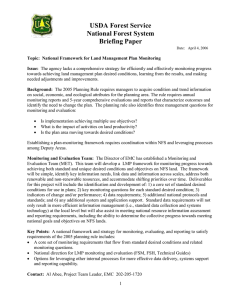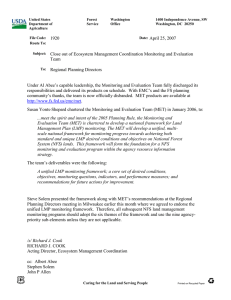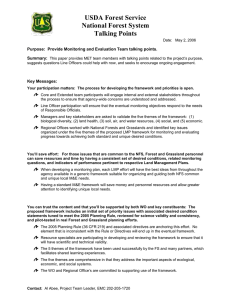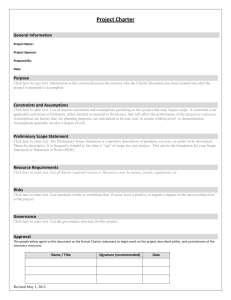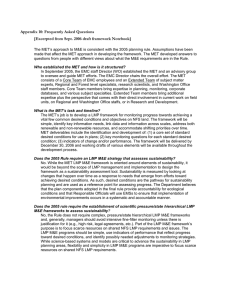Purpose To meet the spirit and intent of the 2005 Planning... (MET) is chartered to develop a national framework for Land...
advertisement
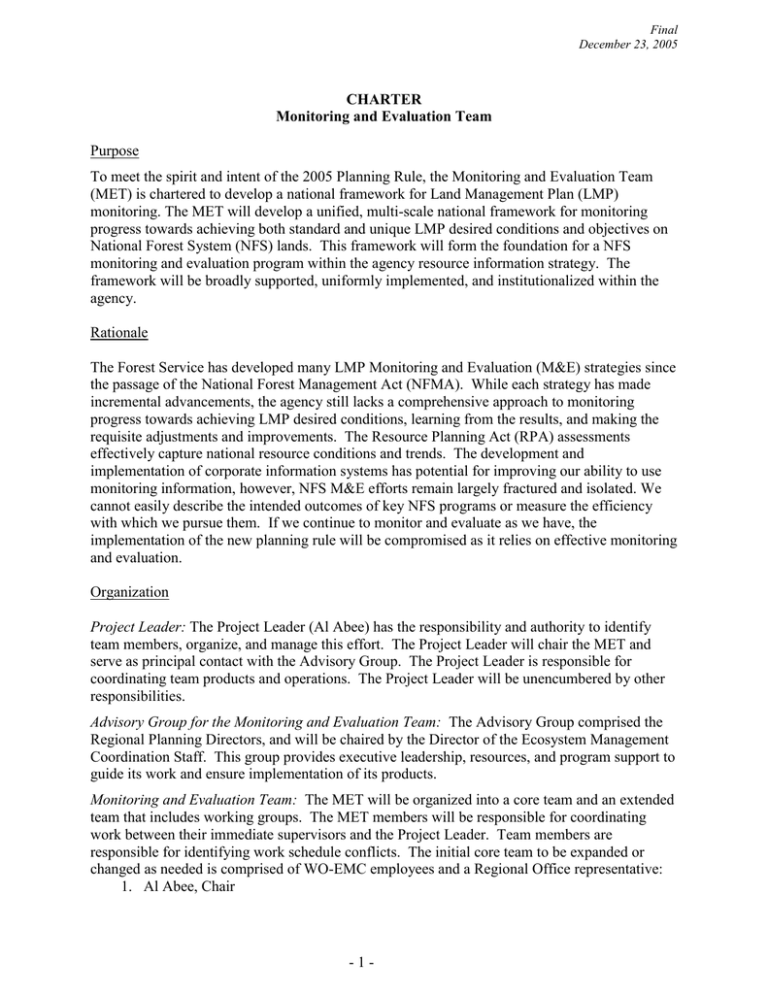
Final December 23, 2005 CHARTER Monitoring and Evaluation Team Purpose To meet the spirit and intent of the 2005 Planning Rule, the Monitoring and Evaluation Team (MET) is chartered to develop a national framework for Land Management Plan (LMP) monitoring. The MET will develop a unified, multi-scale national framework for monitoring progress towards achieving both standard and unique LMP desired conditions and objectives on National Forest System (NFS) lands. This framework will form the foundation for a NFS monitoring and evaluation program within the agency resource information strategy. The framework will be broadly supported, uniformly implemented, and institutionalized within the agency. Rationale The Forest Service has developed many LMP Monitoring and Evaluation (M&E) strategies since the passage of the National Forest Management Act (NFMA). While each strategy has made incremental advancements, the agency still lacks a comprehensive approach to monitoring progress towards achieving LMP desired conditions, learning from the results, and making the requisite adjustments and improvements. The Resource Planning Act (RPA) assessments effectively capture national resource conditions and trends. The development and implementation of corporate information systems has potential for improving our ability to use monitoring information, however, NFS M&E efforts remain largely fractured and isolated. We cannot easily describe the intended outcomes of key NFS programs or measure the efficiency with which we pursue them. If we continue to monitor and evaluate as we have, the implementation of the new planning rule will be compromised as it relies on effective monitoring and evaluation. Organization Project Leader: The Project Leader (Al Abee) has the responsibility and authority to identify team members, organize, and manage this effort. The Project Leader will chair the MET and serve as principal contact with the Advisory Group. The Project Leader is responsible for coordinating team products and operations. The Project Leader will be unencumbered by other responsibilities. Advisory Group for the Monitoring and Evaluation Team: The Advisory Group comprised the Regional Planning Directors, and will be chaired by the Director of the Ecosystem Management Coordination Staff. This group provides executive leadership, resources, and program support to guide its work and ensure implementation of its products. Monitoring and Evaluation Team: The MET will be organized into a core team and an extended team that includes working groups. The MET members will be responsible for coordinating work between their immediate supervisors and the Project Leader. Team members are responsible for identifying work schedule conflicts. The initial core team to be expanded or changed as needed is comprised of WO-EMC employees and a Regional Office representative: 1. Al Abee, Chair -1- 2. Sarah Hall 3. Patrice Janiga 4. Bob Lee 5. Doug Powell 6. Garth Smelser 7. Peter Williams 8. NRIS Representative (Rich Teck?) 9. Sandy Winkler 10. Regional Office Representative Core team members are expected to devote as much time as needed, at the discretion of the EMC Staff Director to this assignment, and will generally be engaged in many of the tasks identified in the program of work. The extended team membership is designed to represent the breadth of expertise and perspectives in the agency. It will draw upon staff assistants and employees represented by the Advisory Team. Extended team members may be involved intermitantly throughout the duration of the Charter and spend up to 30% of their time on charter tasks. Both core and extended team members will be involved in convening workgroups assigned to develop specific products idenitified in the POW. Approach The MET will develop a framework that flows out of the 2005 Planning Rule and is compatible with other related monitoring efforts, such as Adaptive Management Initiative, Resource Assessment and Sustainability Report (RASR), the Sustainability Roundtables, and the 2000 Inventory and Monitoring Framework. This framework will include a minimum, core set, of standard desired conditions to be used, as appropriate, in every land management plan. An initial set of five desired conditions will be developed – one for each of the following themes: Biological Diversity; Land Health; Soils and Water; Social & Economic; and Institutional framework. After developing the initial set of five, additional desired conditions may be developed as appropriate. Tiering from this core set of desired conditions will be appropriate monitoring questions, performance measures and requisite data needs. The standard set of monitoring questions will assist in meeting NFS resource information assessment and reporting requirements. This effort will set priorities by focusing and narrowing forest plan monitoring, and it will be owned by Forest Service leadership to ensure implementation. To ensure relevancy to agency needs, the MET will identify a core set of desired conditions and performance measures based upon field input with affirmation by national program managers. The focus will be on what national forests and grasslands share in common versus what makes them unique. The work will be interdisciplinary and integrated, where appropriate, with other processes and efforts, such as Environmental Management System, Performance Accountability System, national resource assessments, and the Strategic Plan. The MET will conduct its work by meetings, email, and conference calls. It will develop a program of work with quarterly milestones and interim products. At its end it will deliver a -2- unified LMP monitoring framework; a core set of desired conditions, objectives, monitoring questions, indicators, and performance measures; and recommendations for future actions for improvement. The Chair of the MET will report progress to the Advisory Group as requested. Funding EMC will provide resources for travel and other expenses associated with convening workgroups that engage partners and subject matter experts from the field. Work months will be covered by home units. As appropriate, the Project Leader may request additional resources (e.g. contracting) from the EMC Director. Duration of Charter The MET is chartered for 15 months commencing with the date of approval of this charter by the Director of Ecosystem Management Coordination. This charter is approved on January 1, 2006. Susan Yonts-Shepard Director, Ecosystem Management Coordination Attachment: POW -3-
